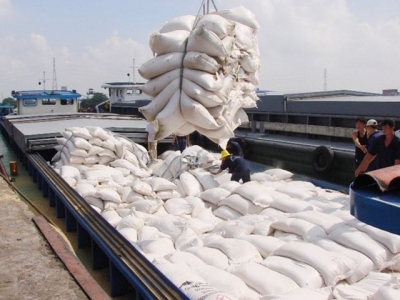Vietnamese rice exports enjoy strong growth despite Covid-19

While many of Vietnamese agricultural exports have faced Covid-19 threat, rice exports during seven months of 2020 increased by 10.9% in value, with the price of 5% broken rice now the highest globally.
According to figures released by the Agro-Processing and Market Development Authority (Agrotrade), Vietnam exported approximately 3.9 million tonnes of rice throughout the seven-month period, grossing US$1.9 billion and representing an annual rise of 10.9% in value, according to VOV.
This marks a positive sign in the context of the export turnover of many key Vietnamese agricultural products declining. Nguyen Quoc Toan, Agrotrade director, told Hanoi Moi (New Hanoi) daily that local rice represents a bright spot for the export growth of the country’s key agricultural items during the reviewed period as it has constantly maintained robust growth in value.
Pham Thai Binh, general director of Trung An High-Tech Farming Joint Stock Company in Can Tho, said the price of this year’s rice exports rose by 20% to 30% from the previous year, with the current export price of fragrant rice being traded at between US$700 and US$900 per tonne. In addition to high-quality rice, other local types of rice have witnessed good prices.
Prof. Vo Tong Xuan, a leading rice expert, attributed the sharp increase in the price of export rice to the global rising demand for rice as concerns grow over the COVID-19 pandemic.
Do Hao Nam, vice president of the Vietnam Food Association, revealed that domestic 5% broken rice has recorded the highest export price in the global market, representing an increase of 10.9% in value despite a decline of 1.4% in quantity.
Insiders believe that the implementation of the EU-Vietnam Free Trade Agreement (EVFTA) in August has presented a wealth of opportunities for local rice businesses to ship their products to the EU market in the near future.
Aside from enjoying preferential tariffs from the EVFTA, Vietnamese rice has a higher value within the EU market, with the export price across several countries such as Germany, France, and Switzerland reaching up to US$1,500 per tonnes.
Moreover, there are also bright prospects ahead for rice export growth, as several traders that operate within the EU are projected to purchase Vietnamese rice to market it in the EU before selling it on to importers in the Middle East and Africa.
However, Prof. Xuan pointed out that the trade deal also poses numerous challenges for Vietnamese rice as the EU market sets forth stringent requirements in terms of origin and food safety, emphasizing that quality remains the key factor in penetrating this demanding market.
Moving forward, experts advised firms to focus on developing brands for Vietnamese rice, especially high-yield rice varieties such as ST25, alongside building high-quality rice cultivation areas suitable for export in line with safe production processes.
To develop concentrated rice growing areas for export and support businesses in promoting the high-quality rice segment for high-end markets, Agrograde director Toan outlined how the agency has designed trade promotion schemes aimed at developing brands for local rice within the global market.
Indeed, Agrograde has outlined plans to disseminate policies and requirements from major markets in an effort to help enterprises finalise legal documents to seize upon opportunities brought about by the EVFTA. Businesses and farmers must change their thinking in rice cultivation and exports while strengthening connectivity for the purpose of sustainable development.
At present, Vietnam’s rice industry appears to be on the right track with a focus on exporting high quality rice varieties, reducing volumes, and enhancing the added value of the product in the world market, all of which have contributed to ensuring national food security and accelerating economic growth.
Related news
 Vietnam’s exporters face tougher Chinese food inspection regime
Vietnam’s exporters face tougher Chinese food inspection regime Vietnam’s agro-forestry-fishery exports to China face many difficulties due to stronger Chinese inspection and supervision of food safety.
 US to send officials to quarantine fruits for export
US to send officials to quarantine fruits for export The Animal and Plant Health Inspection Service, an agency of the US Department of Agriculture, will send officials to Việt Nam to check the quality of fruits
 Vietnamese fruit exports to US halted as Covid-19 keeps inspecting officials away
Vietnamese fruit exports to US halted as Covid-19 keeps inspecting officials away Vietnamese fruit exporters have not been able to ship to the U.S. for days due to a lack of officials to inspect the safety of their products.